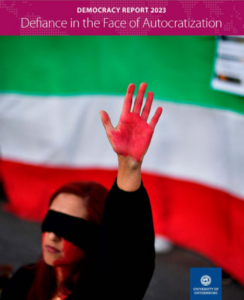 Giving greater attention to instances of democracy’s forward momentum makes sense, say the Carnegie Endowment’s Thomas Carothers and Benjamin Feldman. As the recently released annual assessments by Freedom House and the Varieties of Democracy (V-Dem) Institute highlight, the nascent democratic reform occurring in various countries reflects a real trend worthy of attention.
Giving greater attention to instances of democracy’s forward momentum makes sense, say the Carnegie Endowment’s Thomas Carothers and Benjamin Feldman. As the recently released annual assessments by Freedom House and the Varieties of Democracy (V-Dem) Institute highlight, the nascent democratic reform occurring in various countries reflects a real trend worthy of attention.
To offer analytic grounding and some potential policy insights for this initiative, we carried out an in-depth study of what USAID Administrator Samantha Power (above) in a recent Foreign Affairs article calls “democratic bright spots.” Focusing on thirty-two cases, our research found that these bright spots come in at least four major varieties, they write for American Purpose:
- The first, which is perhaps the archetypal democratic opening in the popular imagination, occurs when citizens mobilize in large numbers to drive a democratically challenged leader from power. This has happened only rarely with full-fledged autocrats in recent years—in Sudan and Algeria—and neither case has turned out well. ….More leadership changes have occurred in places where citizens have mobilized against political leaders who, though not fully autocratic, have been undercutting accountable, responsive governance—like with Burkina Faso in 2014, Guatemala in 2015, and South Korea in 2016. Here too, however, the results have been mixed; there’s been some progress in South Korea, but Guatemala is still gripped by kleptocratic elites, while Burkina Faso is once again under military rule.
 More common and often more positive in outcome over the longer term are the democratic bright spots that have been sparked by pivotal elections. These are the elections where a leader who has been undercutting democracy loses power to a more pro-democratic person or party, despite the original leader’s attempts to manipulate the electoral process or deny its legitimacy. …Our research revealed that democratic bright spots produced by pivotal elections have the best track record: eight of the twelve best performing bright spots in the last decade have stemmed from pivotal elections.
More common and often more positive in outcome over the longer term are the democratic bright spots that have been sparked by pivotal elections. These are the elections where a leader who has been undercutting democracy loses power to a more pro-democratic person or party, despite the original leader’s attempts to manipulate the electoral process or deny its legitimacy. …Our research revealed that democratic bright spots produced by pivotal elections have the best track record: eight of the twelve best performing bright spots in the last decade have stemmed from pivotal elections.- Blocked power grabs—where either a country’s judicial courts or huge public protests stop a leader from overreaching politically (such as trying to extend the presidential term beyond the established constitutional limit)—are another, third, important source of pro-democratic political junctures [as in the Dominican Republic and Nepal]. The successful blocking of an attempted power grab at least temporarily rebalances power between a leader with autocratic tendencies and a pro-democratic political and civic opposition, opening the door for democratic progress.
 A final, fourth category of democratic bright spots—less frequent and often less widely noticed than the three aforementioned—are promising authoritarian successions. These instances feature an autocrat exiting the political scene, usually due to death or infirmity, who is followed by a successor who exhibits (usually unexpected) reform impulses, despite having been installed as an intended continuation of the prior regime [as in Angola and Tanzania]…. True, these and other cases of promising authoritarian succession in recent years have not produced substantial democratic breakthroughs, and they have fallen short of initial hopes. Nevertheless, they do represent potential junctures where some democratic progress becomes possible.
A final, fourth category of democratic bright spots—less frequent and often less widely noticed than the three aforementioned—are promising authoritarian successions. These instances feature an autocrat exiting the political scene, usually due to death or infirmity, who is followed by a successor who exhibits (usually unexpected) reform impulses, despite having been installed as an intended continuation of the prior regime [as in Angola and Tanzania]…. True, these and other cases of promising authoritarian succession in recent years have not produced substantial democratic breakthroughs, and they have fallen short of initial hopes. Nevertheless, they do represent potential junctures where some democratic progress becomes possible.
RTWT







